
|
Department of Microbiology and Molecular Genetics, IMRIC, Faculty of Medicine, HUJI
Prof. Adar investigates how environmental factors like UV radiation and smoking-related chemicals cause DNA damage, and how the body's cells sense and respond to repair these damages. When damages are not repaired, cells accumulate mutations that lead to cancer and other diseases. Using experimental and computational approaches, Prof. Adar’s lab maps these processes across the genome, and aim to uncover why certain DNA regions are more susceptible to damage and how this contributes to aging and diseases.
|
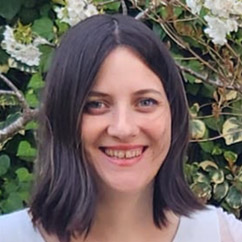
|
Department of Genetics, Alexander Silberman Institute of Life Sciences, Faculty of Sciences and Department of Immunology and Cancer Research, IMRIC, Faculty of Medicine, HUJI
Dr. Adler studies the fundamental principles governing cell behavior within tissues, developing computational and mathematical models to explore tissue stability and response to injuries that can lead to fibrosis. Her work combines theoretical models with experimental evidence to address phenomena in inflammation, fibrosis, and the tumor microenvironment. Her research not only sheds light on tissue health and disease transitions but also enhances understanding of aging processes, such as cellular senescence and chronic inflammation, offering insights into potential treatments for age-related conditions.
|
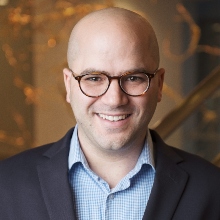
|
Institute for Drug Research, School of Pharmacy, Faculty of Medicine, HUJI
Prof. Amal employs advanced omics technologies and computational biology, along with techniques from biochemistry, pharmacology, and behavioral science, to explore the integration of signaling pathways at molecular, cellular, and systemic levels that regulate cellular functions. His laboratory utilizes proteomics to assess protein expression and their post-translational modifications (PTMs), offering crucial insights into the cellular state. Combined, this interdisciplinary approach is used to identify potential drug targets and biomarkers for a variety of conditions, including aging and related diseases such as Alzheimer's disease (AD).
|

|
Department of Medical Neurobiology, IMRIC, Faculty of Medicine and the Department of Cognitive and Brain Sciences, Faculty of Humanities, HUJI
Dr. Arzi studies the unconscious brain's abilities and limitations, focusing on two states: natural loss of consciousness during sleep and pathologically induced altered consciousness following brain injury. Her laboratory takes an interdisciplinary approach, combining basic and clinical neuroscience with diverse aspects of brain-body activity using behavior, electrophysiology, and neuroimaging. This multifaceted methodology aims to elucidate consciousness state dynamics, enhance the understanding of the processes promoting recovery of consciousness, and develop novel diagnostic and prognostic tools to improve medical care following brain injury throughout life.
|

|
Department of Medical Neurobiology, IMRIC, Faculty of Medicine, HUJI
Prof. Arzy has applied advanced computational tools to develop new methods for very early identification of patients at risk for Alzheimer's disease. In addition, he uses computational methods to analyze impairments in the orientation abilities of Alzheimer's patients, holding the promise of assisting elderly Alzheimer's patients with orientation and thus safer mobility.
|

|
Braun School of Public Health, Faculty of Medicine, HUJI
Dr. Ben-Haim's research aims to unlock how our actions starting from early pregnancy to adulthood sculpt the epigenome, the "control panel" of our genes. By studying lifestyle factors like diet, exercise, and different exposures, we can try to understand what affects our "epigenetic clock" and promote healthy aging. The lab uses powerful computational tools to analyze data and identify interventions that could potentially even rewind this clock, paving a path towards a longer, healthier life.
|

|
Department of Immunology and Cancer Research, IMRIC, Faculty of Medicine, HUJI
Prof. Ben-Neriah is a world-leading cancer researcher. He has developed a new biological drug for acute myeloid leukemia (AML) which is currently in clinical trials. Prof. Ben-Neriah is studying how mutations accumulate in the body, and, specifically, in blood cells, during age, and how this affects aging and cancer development.
|
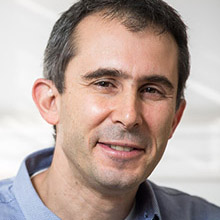
|
Department of Developmental Biology and Cancer Research, IMRIC, Faculty of Medicine, HUJI
Prof. Ben-Porath studies the links between cancer and aging. Prof. Ben-Porath integrates computational methods to study the process of "cellular senescence"— how cells undergo an aging-like process and accumulate in our body as we age. Prof. Ben-Porath's work is uncovering how these cells influence aging, diabetes, cancer, and other diseases, and is working to develop drugs against these cells and thus to reduce aging-associated disease.
|

|
Edmond & Lily Safra Center for Brain Sciences (ELSC), HUJI.
Prof. Bergman studies the basal ganglia and Parkinson's disease. He is best known for the development of the groundbreaking surgical treatment for Parkinson's patients – deep brain stimulation (DBS). More than 30,000 Parkinson's patients have benefited from Prof. Bergman's innovative therapy and DBS is now standard care therapy for most Parkinson's patients.
|

|
Department of Developmental Biology and Cancer Research, IMRIC, Faculty of Medicine, HUJI
Prof Cedar, along with colleague Prof. Aharon Razin, elucidated the principles of DNA methylation and epigenetics, shaping our understanding of these fundamental processes of biology, and showing how they can influence clinical cancer diagnosis and treatment; for these insights, they have won numerous awards including the Israel, Wolf and Gairdner prizes. His lab currently studies how gene regulation changes during aging, leading to deteriorated tissue function.
|
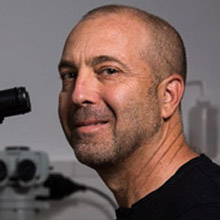
|
Department of Biochemistry and Molecular Biology, IMRIC, Faculty of Medicine, HUJI
Prof. Cohen focuses his research on the aberrant protein aggregation that is a common feature of human neurodegenerative disorders such as Alzheimer's and Parkinson's diseases. Why these maladies onset late in life and whether the aging process plays active roles in allowing their manifestation are key questions that are addressed in his lab. His aim is to harnessing the mechanisms that prevent the onset of neurodegenerative diseases early in life to protect the elderly from these devastating maladies.
|

|
Department of Developmental Biology and Cancer Research, IMRIC, Faculty of Medicine, HUJI
Prof. Dor is one of Israel's leaders in diabetes research and has uncovered fundamental principles of the function of the pancreas. Prof. Dor developed a new method for "liquid biopsy" in which small gene fragments released by dying cells are found in the blood of patients. He is applying this approach to the early detection of a wide range of age-associated diseases, including cardiovascular disease, Alzheimer's and cancer, collaborating with a wide range of physicians in many medical centers around the world.
|
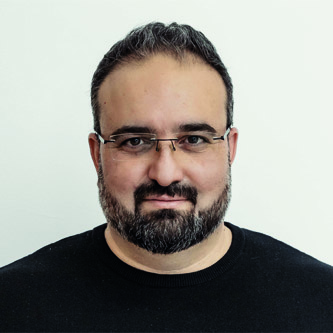
|
Department of Developmental Biology and Cancer Research, IMRIC, Faculty of Medicine, HUJI
Prof. Elkouby has developed a multidisciplinary approach to studying the developing ovary, pioneering the use of deep-learning methods and live microscopy to track egg production. His research has led to significant breakthroughs in our understanding of human reproduction. Notably, his lab investigates the reproductive aging in human females, caused by the cessation of egg production over time. By studying the zebrafish ovary—where egg production is continuous and similar to humans—his team aims to uncover the fundamental mechanisms of ovarian reproductive regeneration and identify the key factors absent in humans. Prof. Elkouby has received prestigious awards, including the ZCAI Prize for Discovery in Medical Research, an ERC Consolidator Grant, and the EMBO Young Investigator Award.
|

|
Institute of Chemistry, Faculty of Sciences, HUJI. Director, Singapore-HUJI Alliance for Research and Enterprise (SHARE).
Prof. Friedler’s research focuses on using peptides to study and modulate protein–protein interactions (PPI), both as tools for understanding molecular mechanisms and as potential therapeutic agents. The lab targets intrinsically disordered proteins, particularly those involved in aging-related neurodegenerative diseases. A major focus is the Tau protein, linked to Alzheimer’s disease, where the team investigates phosphorylation patterns driving Tau aggregation. In parallel, the lab develops peptides that block early aggregation stages of disease-related proteins, including Tau and Huntingtin, effectively preventing their progression into harmful aggregates.
|
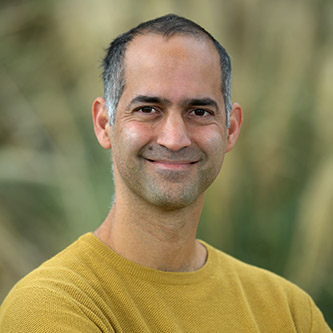
|
Department of Medical Neurobiology, IMRIC, Faculty of Medicine.
The laboratory of Dr. Ariel Gilad investigates brain-wide dynamics underlying cognitive functions such as learning, memory, and navigation. Using mouse models and mesoscale imaging techniques such as wide-field imaging and multi-fiber photometry, the team measures signals across dozens of cortical and subcortical areas as mice perform both head-fixed and freely moving behaviors. A major focus is the disordered brain, particularly in Alzheimer’s disease (AD). To this end, the lab records brain-wide neuronal activity in mutant AD mice during tasks such as spatial navigation and object recognition. The goal is to detect network-wide degeneration in AD and identify key brain regions closely linked to disease progression.
|
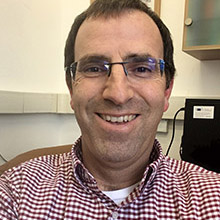
|
Department of Medical Neurobiology, IMRIC, Faculty of Medicine, HUJI
Prof. Goldberg focuses on the physiological mechanisms underlying neurodegeneration in Parkinson's disease. His lab uses experimental and computational tools, including advanced imaging techniques and mathematical modeling to study Parkinson's disease. Especially interesting is his study of prodromal symptoms of Parkinson's Disease which may serve as an "early warning system" for the disease.
|

|
Department of Biochemistry and Molecular Biology, IMRIC, Faculty of Medicine, HUJI
Dr. Gross studies the delicate balance of oxygen regulation. Oxygen metabolism creates reactive oxygen species that may underlie the development of many pathological conditions including atherosclerosis (hardening of the arteries), Alzheimer's and Parkinson's disease, and many age-associated diseases. He uses a worm model to explore oxygen metabolism, using imaging techniques, biochemistry, genetics, and behavioral experiments.
|
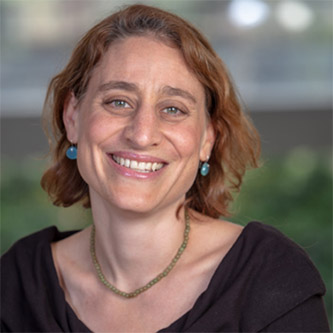
|
Edmond and Lily Safra Center for Brain Sciences (ELSC), HUJI
Dr. Habib studies the aging process in the brain and age-related neurodegenerative diseases, such as Alzheimer's disease. Her laboratory integrates advanced computational modeling and cutting-edge omics technologies at single-cell resolution to investigate how the cellular environment of the brain changes with age and disease, and how the aging body interacts with the aging brain, particularly focusing on the immune system.
|
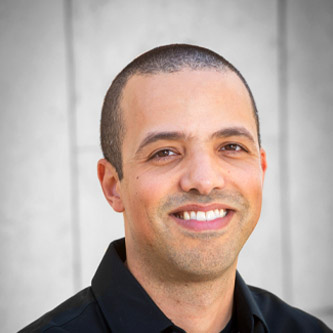
|
Life Sciences Institute, HUJI.
Dr. Harel's goal is to understand how organisms age. To address this challenge, he recently developed a comprehensive genetic platform for rapid exploration of aging and disease in the shortest-lived vertebrate, the African turquoise killifish. Using this emerging model, he is trying to answer fundamental questions in biology. Specifically, his lab focuses on identifying novel approaches for extending health span, and better understanding why aging is such a strong driver of disease.
|
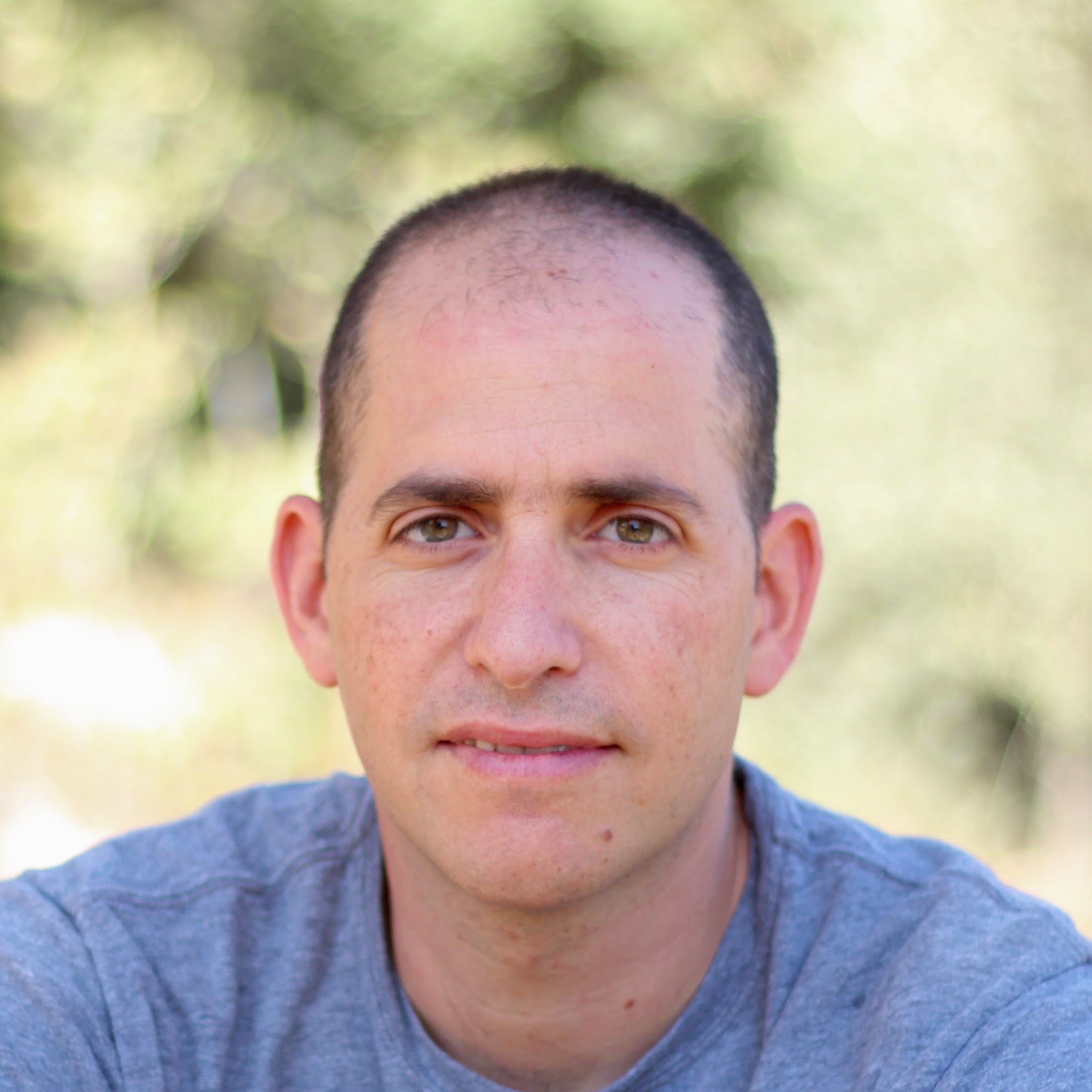
|
Department of Developmental Biology and Cancer Research, IMRIC, Faculty of Medicine and the School of Computer Science and Engineering, HUJI
Prof. Kaplan's research focuses on computational and machine learning analysis of high-throughput genomic data, including DNA methylation and chromatin, cell-free DNA, gene regulation and enhancers, and 3D genome folding.
|

|
Department of Developmental Biology and Cancer Research, IMRIC, Faculty of Medicine, HUJI
Prof. Keshet has pioneered the molecular understanding of blood vessel formation, known as angiogenesis, as well as its connection to cancer and cardiovascular diseases, which has led to new treatment modalities for cancer and blindness-causing macular degeneration. Among his many recognitions and awards are the EMET Prize, the Rothschild Prize, the TEVA Prize, and the North American Vascular Biology Organization (NAVBO) Prize.
|
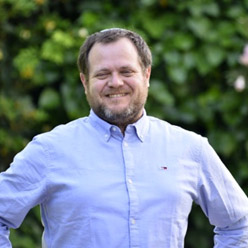
|
Institute of Biomedical and Oral Research, Faculty of Dental Medicine, HUJI
Professor Klutstein's research explores the aging epigenome and its impact on reproductive aging, with a special focus on enhancing IVF oocyte quality and understanding female reproductive aging. Utilizing both mouse models and clinical samples from IVF clinics, his pioneering work has led to innovative patents that offer new solutions to combat oocyte aging.
|

|
Department of Medical Neurobiology, IMRIC, Faculty of Medicine, HUJI
Dr. Mansour is working on using stem cell-based technology to understand and develop therapeutics for neurodegenerative diseases of aging such as Alzheimer's and Parkinson's and has engineered brain-like tissue (mini-brain) in the lab, allowing him to study neurodegenerative diseases processes and potential therapeutic strategies outside of the human body.
|

|
Department of Medical Neurobiology, IMRIC, Faculty of Medicine, HUJI
Dr. Melamed studies neurodegenerative disorders, especially amyotrophic lateral sclerosis (ALS) and frontotemporal dementia (FTD), using a "disease in a dish" model. Employing advanced techniques like converting patient fibroblasts into neurons, CRISPR gene-editing, and high-throughput sequencing, his lab aims to understand age-related neurodegeneration mechanisms. A significant focus is on the role of RNA-binding proteins and how faulty RNA processing affects the central nervous system as it ages. Additionally, his lab is pioneering RNA-targeting treatments for neurodegenerative conditions, offering insights into both basic and applied aspects of these diseases.
|

|
School of Computer Science and Engineering, Racah Institute of Physics, and the Faculty of Medicine, HUJI.
Dr. Nitzan's research is focused on the representation, inference and design of multicellular systems. She develops models and computational frameworks to better understand how cells encode multiple layers of spatial and temporal information, and how to efficiently decode that information from data such as single-cell RNA-sequencing and spatial transcriptomics data. Dr. Nitzan aims to uncover organization principles underlying collective cellular behavior, such as information processing, computation, division of labor, and self-organization of multicellular structures, as well as the disruption of these processes in disease. Projects related to aging include characterizing changes in cellular order, diversity, and function during aging, and identifying maximally informative gene expression signatures for age-related diseases like Alzheimer's disease.
|
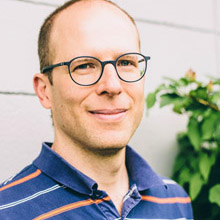
|
Department of Medical Neurobiology, IMRIC, Faculty of Medicine, HUJI
Dr. Rabinowitch studies brain plasticity and reorganization following neuronal loss using a simple model brain, that of the 1mm long nematode worm, C. elegans, which consists of only 302 neurons. His insights derived from worms can be used to provide new directions for understanding how the brain copes with neurodegeneration, including in Alzheimer's disease, and how we can support it in its efforts to adjust and compensate for the damage. Exploration and explication of these processes may thus lead to the development of new treatment protocols for Alzheimer's and other devastating neurodegenerative diseases.
|

|
Department of Biochemistry and Molecular Biology, IMRIC, Faculty of Medicine, HUJI
Prof. Sharon is interested in the biochemistry, molecular and cell biology of neuronal degeneration during aging of the mammalian brain, particularly in Parkinson's disease and related neurodegenerations, collectively called synucleinopathies. The laboratory originally developed methods for the detection and analysis of α-Synuclein protein, which is the pathogenic hallmark of the neuropathology of age-related synucleinopathies. She investigates the normal physiological function of α-Synuclein and the mechanism by which α-Synuclein mutations produce neurodegenerations.
|
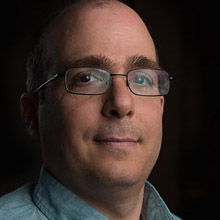
|
Department of Biochemistry and Molecular Biology, IMRIC, Faculty of Medicine, HUJI
Prof. Shaul focuses his research on the role of metabolic processes in regulating cancer cell state. Through gene expression analysis, he identified a direct association between the adaptor protein DPYSL2 (CRMP2) and breast cancer aggressiveness. Mechanistically, his lab discovered that DPYSL2 interacts with JAK1 and serves as a pivotal regulator of STAT3 signaling and cancer cell migration. Interestingly, DPYSL2 has also been implicated in neurodegenerative diseases, although the molecular mechanisms underlying its role in Alzheimer's disease remain unknown. The laboratory of Prof. Shaul aims to characterize the DPYSL2 interactome and define its contribution to AD progression and neuronal architecture.
|

|
Department of Biochemistry and Molecular Biology, IMRIC, Faculty of Medicine, HUJI
Dr. Shpilka studies how mitochondrial and peroxisomal function promotes healthy aging and how their dysfunction drives aging and disease. His research uncovers molecular mechanisms of organelle stress and explores strategies to cure organelle dysfunction and preserve cellular health.
|

|
Department of Microbiology and Molecular Genetics, IMRIC, Faculty of Medicine, HUJI
The laboratory of Prof. Simon studies the genomic organization of DNA replication under both normal and stressed conditions. The team has developed advanced tools to examine key features of the replication process, such as fork speed, inter-origin distance, replication timing, and origin coordination. A central focus is understanding how changes in replication dynamics contribute to mutagenesis. In the context of aging, Prof. Simon is particularly interested in how the replication program evolves over time and how these changes affect genome stability.
|

|
Department of Biochemistry and Molecular Biology, IMRIC, Faculty of Medicine, HUJI
Prof. Stern-Bach's research focuses on the ionotropic glutamate receptors, particularly the AMPA receptors, the major components of excitatory cell-to-cell communication in the brain. Malfunction of AMPA receptors underlies several neurological conditions, including age-related neurodegenerative diseases. Her lab is using a combination of molecular, biochemical, electrophysiological and imaging techniques to uncover how these receptors operate as molecular devices and how they are regulated by interaction with several families of auxiliary proteins, with the goal of providing new strategies for the treatment of the related neurodegenerative disorders.
|
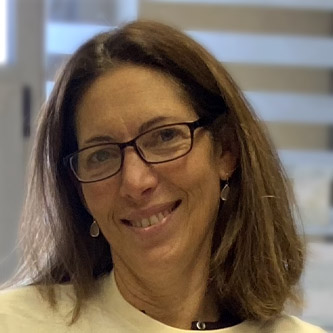
|
Department of Developmental Biology and Cancer Research, IMRIC, Faculty of Medicine, HUJI
Research in the lab of Dr. Tzfati explores how aging increases susceptibility to metabolic decline, insulin resistance, and type 2 diabetes (T2D). The team focuses on the impact of aging on pancreatic alpha and beta cells, employing a range of approaches including analysis of DNA methylation patterns and cellular senescence. Using a unique mouse model engineered to carry human-length telomeres, the lab investigates how telomere shortening—a hallmark of aging—contributes to impaired metabolic health and may accelerate the onset of T2D. This work aims to uncover key molecular mechanisms that connect the aging process with metabolic dysfunction, ultimately guiding the development of more effective interventions for age-related diseases. |
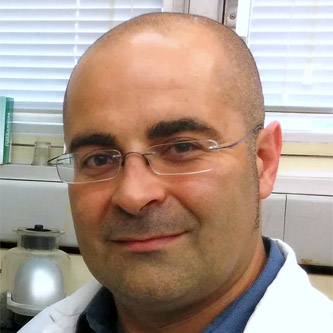
|
Department of Genetics, Institute of Life Sciences, Faculty of Science, HUJI
Dr. Tzur delves into the mechanisms governing germline aging. Employing both simple model organisms and human samples, his research looks at how the development of oocytes and sperm alters over time. His team is dedicated to pinpointing the genetic and biochemical pathways underlying these changes and exploring strategies to control them. Ultimately, the overarching aim is to pioneer techniques facilitating fertility procedures in individuals of advanced age.
|

|
School of Pharmacy, Faculty of Medicine, HUJI
Dr. Umschweif-Nevo studies the cellular and molecular foundations of depression, a common psychiatric disorder among older adults, often linked to loneliness. Her laboratory employs advanced molecular, physiological, and behavioral methods to identify and develop novel, cell-type-specific drug targets for more effective antidepressants.
|
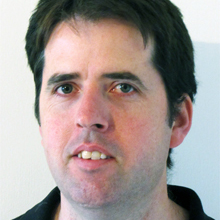
|
Department of Biochemistry and Molecular Biology, IMRIC, Faculty of Medicine, HUJI
Prof. Weiner is interested in the molecular mechanisms of protein modifications by ubiquitin-like proteins (UBLs). The connection between protein modifications by UBLs and aging is highly appreciated over the last few years and the work in the lab aims to expose new targets for anti-aging drug development.
|

